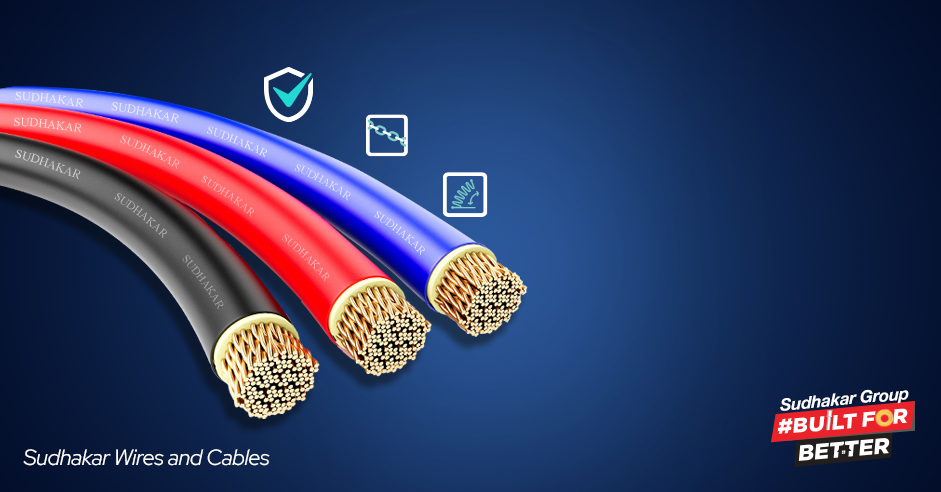The wiring system forms the backbone of any electrical infrastructure, and poor-quality wire can lead to serious risks like electrical fires, system failures, and expensive repairs. Selecting the right electrical wire from reputable wire manufacturers is crucial for ensuring safety, efficiency, and durability. In this guide, we will outline the key features to consider when choosing high-quality electrical wire for your projects.
Why Choosing the Right Electrical Wire Matters
Before we delve into the important features of a good quality electrical wire, it’s essential to understand why the choice of wire matters:
1. Safety: Electrical wiring needs to meet rigorous safety standards to ensure that it does not overheat, cause fires or pose any risk to the occupants of a building.
2. Efficiency: High-quality wire ensures minimal energy loss, resulting in better energy efficiency and lower operational costs.
3. Durability: Electrical wires that are made from superior materials are more durable, which means they are less likely to degrade over time, providing a longer lifespan and reducing the need for costly replacements.
4. Compliance with Standards: Electrical wiring must adhere to local and international electrical codes to ensure safe and effective installation.
High-Quality Electrical Wires by Sudhakar Group: Key Features
When selecting electrical wires for any project, there are several features to consider to ensure you are choosing the best product for your needs:
1. Material Quality (Copper vs. Aluminum)
The material used in the manufacture of electrical wire plays a major role in its performance. Copper is the most commonly used material due to its excellent conductivity and durability. It is more efficient in carrying electrical current over longer distances and is also more resistant to corrosion. However, it is generally more expensive than aluminum, which is also used in electrical wiring. While aluminum is lighter and less expensive, it is more prone to oxidation and requires careful installation to ensure safety.
At Sudhakar Group, we use high-quality copper and aluminum for our electrical wire products, ensuring optimal performance and long-lasting durability.
2. Insulation Type and Thickness
The insulation of electrical wire serves to protect the wiring and prevent short circuits, electric shocks and fires. The type of insulation used is a critical factor to consider. Some common insulation materials include:
● PVC (Polyvinyl Chloride): It is one of the most widely used insulation materials due to its affordability and effective protection against moisture and chemicals.
● XLPE (Cross-Linked Polyethylene): This insulation material offers better resistance to heat and chemicals, making it suitable for high-temperature environments.
● Rubber: Rubber-insulated wires are flexible and durable, ideal for industrial applications where wires need to withstand movement and bending.
The thickness of the insulation also plays a crucial role in protecting the wire from damage. The higher the insulation thickness, the better the protection from external elements and the safer the wire.
3. Wire Gauge (Thickness)
The wire gauge refers to the thickness of the wire and determines the amount of current the wire can safely carry. Electrical wire comes in various gauges, and choosing the correct wire gauge is essential for safety and efficiency. A thicker wire (lower gauge number) can carry more current, while a thinner wire (higher gauge number) is suited for lighter electrical loads.
Using a wire that is too thin for the required electrical load can cause overheating, leading to potential system failure or fire hazards. It is important to consult with a professional to ensure you select the correct gauge wire for your electrical needs.
4. Voltage Rating
Every electrical wire has a voltage rating, which indicates the maximum voltage that the wire can safely carry. This rating ensures that the wire can handle the electrical load without risk of insulation failure or electrical hazards. Always check the voltage rating of the wire and ensure it is suitable for your project’s requirements.
5. Resistance to Environmental Factors
Electrical wire is often exposed to various environmental conditions, including temperature extremes, moisture and chemicals. A high-quality electrical wire should be resistant to these elements to maintain its performance over time. For example, in outdoor or industrial applications, wires need to be able to withstand UV exposure, corrosion and physical damage.
Look for wires that are specially designed for such conditions, such as those with weather-resistant or flame-retardant coatings. Sudhakar Group’s electrical wire products are designed to offer optimal protection against environmental factors, ensuring reliable performance in all conditions.
6. Certifications and Compliance
A key indicator of the quality of electrical wire is the certification and compliance with industry standards. Look for products that meet or exceed local and international safety standards. Some common certifications include:
● ISI (Indian Standards Institute) certification for quality and safety.
● CE marking, which indicates that the product complies with European health, safety, and environmental protection standards.
● UL (Underwriters Laboratories) certification for safety in the United States.
By choosing wires from certified wire manufacturers, you ensure that the wire meets rigorous safety standards and regulations.
7. Flexibility and Ease of Installation
Electrical wires need to be flexible enough for installation in different environments. Whether you’re wiring a house or installing equipment in an industrial setting, ease of handling and installation is important. Wires with good flexibility are easier to work with, especially when it comes to bending them around corners or fitting them into tight spaces.
High-quality wires from wire and cable manufacturers like Sudhakar Group are designed for both durability and ease of use, making installation a hassle-free process.
Conclusion
When choosing electrical wire for your home, office, or industrial project, it is important to consider several factors to ensure that you are purchasing a high-quality, safe and efficient product. At Sudhakar Group, we are committed to providing high-quality electrical wire solutions that meet the needs of our customers. With a focus on safety, durability and innovation, we ensure that our products are designed to deliver reliable performance and energy efficiency for years to come.


